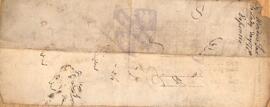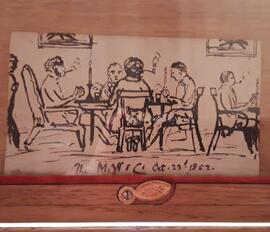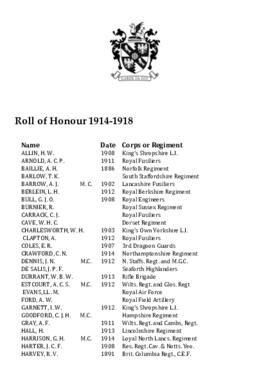Framed black and white photograph of W.S. Wigglesworth (Vicar-General, York and Dean of Arches, Canterbury).
Colour photograph showing the boat during the race. No names given.
Printed form completed by hand
Cambridge [‘shire’ struck out] Town
Receiv’d 18 April 1778 of the Collectors for [‘the Parish of’ struck out] Magdalen – the sum of three pounds 11s 8d for one half Year’s Duty on Houses and Lights, due Lady day – last past.
Total: £3 11s 8d
Salary paid: £0 0s 9d Butlers Salary
Neat money: £3 10s 11d
For [?]
Johnson [?]
Cigarette card issued by W.D. & H.O. Wills of Vristol and London as part of a series of 42 cards showing the Arms of Oxford and Cambridge Colleges. The Arms are shown on the front in colour and there is a brief history of the college on the back.
Recorded on page 101 of the Muniment Book.
Parties: (1)
Will of Thomas Huckings made on 12 April 1798 and proved on 3 February 1801 in which he left his property to his nephew John Paine (farmer).
Copy of the will of the Revd William Bywater.
Will of Peter Betson (cook).
Will of Peter Betson (grocer).
Probate of the will of John Prance of Doddington whereby he gave all his house, in the parish of St Clement's to Margaret his wife so long as she should be a widow and after he gave his house called 'The Half Moon' to his son Simon Prance and his heirs.
Will of James Wendy in which he left land and property to his wife Anne.
Copy of the the will of James Duport in which he devised to the Master and Fellows of Magdalene College his farm and lands purchased from Nicholas Jacob and his wife in Quy etc charged with an annuity of £10 to the Dean and Chapter of Peterborough.
Will of George Willoughby in relation to the Pickerel estate.
Will of Frances Read Wentworth (spinster).
Probate of the will of Elizabeth Wallis dated 31 December 1600 [in connection with the White Bull Inn].
'The Type Designs of Will Carter' by Sebastian Carter, The Typophiles, New Series No. 32
Accounts for Wentworth House (which was bought by the College in 1835) listing rents received from tenants (Mr Shillito, 1834-40, Mr Barron, 1842-1948, Captain Davies, 1852-1861 and Mr Catling, 1862- at least 1865 when the volume ends). Also payments for repairs and general upkeep.
Warrant from Henry Hargrave to Edward Breese with livery of seisin endorsed.
Printed valuations of investments prepared by McAnally, Montgomery & Co.
Valuation of fixtures left at the White Bull Inn by James Cook and taken by the College. Receipt for what was taken.
Valuation prepared for the Master and Fellows of Magdalene College by Messrs Bidwell& Sons of 13 and 14 Magdalene Street, 1-6 Northampton Street and 1-2 Briggs Court.
Valuation prepared for the Master and Fellows of Magdalene College by Messrs Bidwell& Sons of 10-15 Northampton Street, the property of Messrs Warrington.
Valuation and terrier of lands at Stow Cum Quy belonging to Magdalene College (draft and final version).


